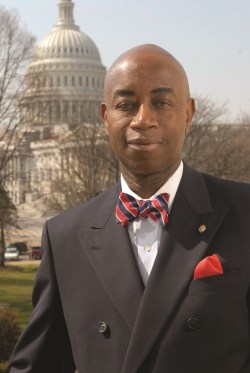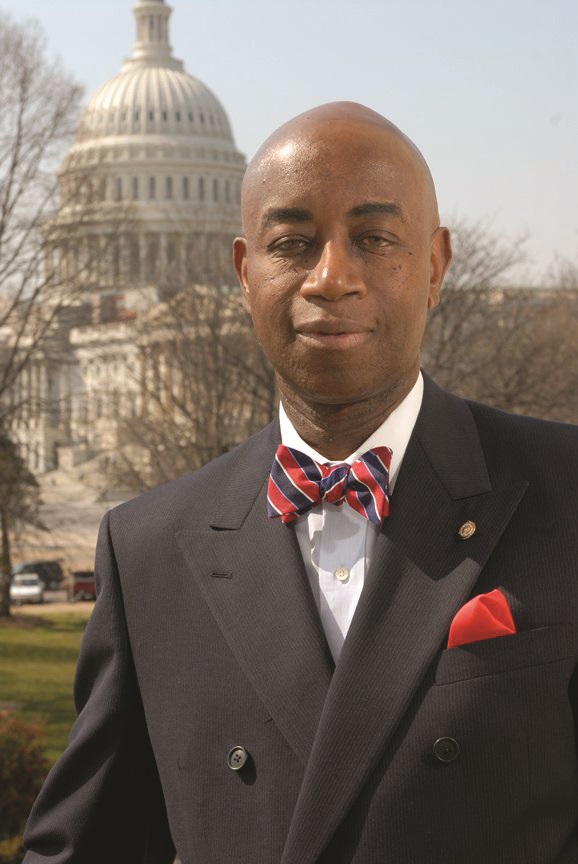When Senate chaplain Barry Black finished his keynote address at the National Prayer Breakfast on February 2, the normally restrained crowd of religious leaders, politicians, and visiting dignitaries jumped to their feet and cheered wildly. Then President Trump took the podium and voiced his appreciation. “I don't know, Chaplain, whether or not that’s an appointed position,” President Trump said. “I don’t even know if you’re a Democrat or if you’re a Republican, but I’m appointing you for another year.” We caught up with Black to talk about his new book, Nothing to Fear, pastoring both sides of the political aisle, and the importance of a leader’s “ethical congruence.”
Many described 2016 as a scary year. But the message of your book is that there’s nothing to fear. Can you unpack that?

Well, it’s a message that’s all through the Bible. First John 4 says, “There is no fear in love, for perfect love casteth out fear.” And 2 Timothy 1:7 says, “God has not given us a spirit of fear.” So whenever we as people of faith begin to experience the fear effect, we know immediately that it is not of God. We need to question and challenge it. And as we discover how perfect love enables us to cope with fear, then we ought to be able, as leaders, to share those coping strategies with others.
When a senator comes to you with fears and worries, how do you respond?
It’s very difficult to live in this world without some anxiety and fear. Our Lord said, “In this world you will have trouble” (John 16:33). In Job 14:1, it says, “Man that is born of a woman is of few days, full of trouble.” I’ve had a number of senators with health challenges, and they’re scared, as anyone would be. I’ve counseled men with a grandchild in some desperate strait or bad relationship. So it’s not just what happens in the chamber or in the committee room. In the course of their personal lives, they’re confronted with things that can terrify. When the doctor says, “We’ve done all we can,” or when the doctor gives you an expiration date, these are the realities that our lawmakers have to deal with in spite of all the other stuff they are juggling.
No matter how much money you have, no matter how much power and position you have, there are always things you can’t control. You can’t avoid every crisis. You can’t keep your children alive. Not in this crazy world. There are no guarantees, and that’s why I turn to the Psalms: “Call upon me in the day of trouble, and I will deliver you” (Psalm 50:15). So they come because of those kinds of fears, and it’s more common than many people would suspect.
You were appointed chaplain to the United States Senate 14 years ago now. What changes have you seen in your role as you’ve served several different administrations?
The role has remained fairly consistent. I am a pastor of some 7,000 people who make up the Senate and staff on Capitol Hill. That includes the lawmakers and members of their families. I offer an invocation for the convening of the session of the Senate, conduct Bible studies, spiritual mentoring classes, visitations, funerals, memorial services, observances, those kinds of things. I’m just a pastor, their pastor away from home. Just as we have a physician in the Capitol because they can’t go to their family physicians, they can’t go to their family pastors. These folks are away from home, representing all of the states. So I am there to serve them.
Politicians are just human beings. These folks need God as much as we need God.
There have not been dramatic changes over the past 14 years. Just like any other pastor, I continue to preach the Word of God because that’s where our power is—in the Word. I mean, the very presence of God is in the Word. And when you speak the Word this power is released. There’s spiritual warfare going on, so I do an awful lot of intercessory prayer, an awful lot of prayer that only God hears. That’s a critical part of who I am as the chaplain of the Senate.
We tend to see politicians as confident, even brash. Do you see a different side of them when you are offering spiritual counsel?
Politicians are just human beings. Simply because someone has an impressive position or Ivy League training, it doesn’t mean we’re dealing with Superman or Wonder Woman. These folks need God as much as we need God. And the same ineptitude that we bring to so much of what we do—our parenting, our relationships, our marriage—they bring to their work as well. Having said that, I echo Paul in Philippians 4 in saying there are saints in Caesar’s household. Every week a group of senators come together for a prayer breakfast. Every week I teach a Bible study attended by senators. These are individuals who, for the most part, have a biblical worldview; for the most parts, have a testimony regarding their faith pilgrimage. But, just like the leaders in Scripture and the leaders in history, they make mistakes and they play it out as best they can. They’re patriots. They’re passionate about the country. But they need God just like everyone else.
Every pastor ministers to a congregation that is divided along certain lines. Yet your congregation, the Senate, is literally divided along party lines. What are some challenges you face there in offering spiritual counsel on both sides of the aisle?
It’s not nearly as difficult as it would seem. These are good people, but they have different philosophical understandings about what makes government work best. One group is basically saying, “Bigger government.” The other group is saying, “The less government the better.” But they sit in the Bible studies and they discuss and understand Scripture just like any member of a congregation. I sometimes have to check and say, “Is this person Republican or Democrat?” At the Bible studies and prayer breakfasts political affiliation is never mentioned. It’s like two lawyers slugging it out in court and then saying, “Where are you eating tonight?” It really is. And they interact. You see them together, laughing, studying the Word of God together, Republicans and Democrats and independents. And at the end of our prayer breakfasts we stand each week, hold hands, and pray. It’s not as polarized as TV leads us to believe.
What is the essential job of a spiritual leader during a time of crisis?
I would go with Paul’s teaching: the first responsibility is that the leader be above reproach. It’s about what Aristotle called “ethos.” People must perceive that you are ethically congruent. That is so critical it cannot be underestimated. When people have confidence in you as a moral and ethical person, when they trust you, my goodness, they will follow you anywhere. They know that you’re not playing games. But you cannot persuade without ethos. We see the importance of this play out so frequently when a religious leader gets publicly disgraced. Suddenly that leader’s power evaporates like Samson’s. He’s making the same moves, saying the same words, but the power is gone.
When people have confidence in you as a moral and ethical person, my goodness, they will follow you anywhere.
There was a boxer that people called Carl “The Truth” Williams. He had all the bravado that accompanied a heavyweight boxer, but he had the skills to back it up. Everyone knew that when you stepped into the ring with Carl, the truth would reveal itself. In a similar way, your life should be the truth. And I think one of the greatest tributes ever made by enemies is in Daniel 6:4. They had been trying to get dirt on Daniel, and they finally concluded, “We can find nothing against this Daniel except it be concerning the law of his God.” So one of the greatest spiritual leaders who ever lived was above reproach. They couldn’t find anything on him.
So you’re saying trust is paramount for a leader.
Exactly. Churchill was trusted. And as powerful as his speeches were, if it were not for the ethical congruence of Churchill, no one would have believed him when he said, “So let us brace ourselves for duty, and so bear ourselves that if the British Empire should last a thousand years, men will say, this was their finest hour.” This guy had a history, so he could say that, and people would respond, “Okay, we can do this. We will fight them on the beaches. We will fight them …”. Or think of Franklin Roosevelt. “December 7, 1941, a day that the American people in their righteous might …” This guy couldn’t even walk. But it’s the ethical congruence, man, the ethos. You never lead without the ethos.
That’s why we followed Martin, because we believed in who he was as a person. We remembered when his home was bombed, and he dissuaded those who wanted to go the road of violence. The man was the real deal. When that demented woman in Harlem stabbed him, he responded with compassion and love. Talk about ethical congruence! When somebody stabs you and you look at them with compassion, it’s like our Lord saying, “Father, forgive them, for they know not what they do.” That’s ethical congruence, man. When you got that, what’s going to stop you?
Any other advice or encouragement for pastors leading in a fractured, polarized time?
I would give them the words that Mordecai gave to Esther and Esther bore. He said, “If you don’t do something, deliverance will come from another source. But you and your people will perish. And who knows whether you are come to the kingdom for such a time as this.”










